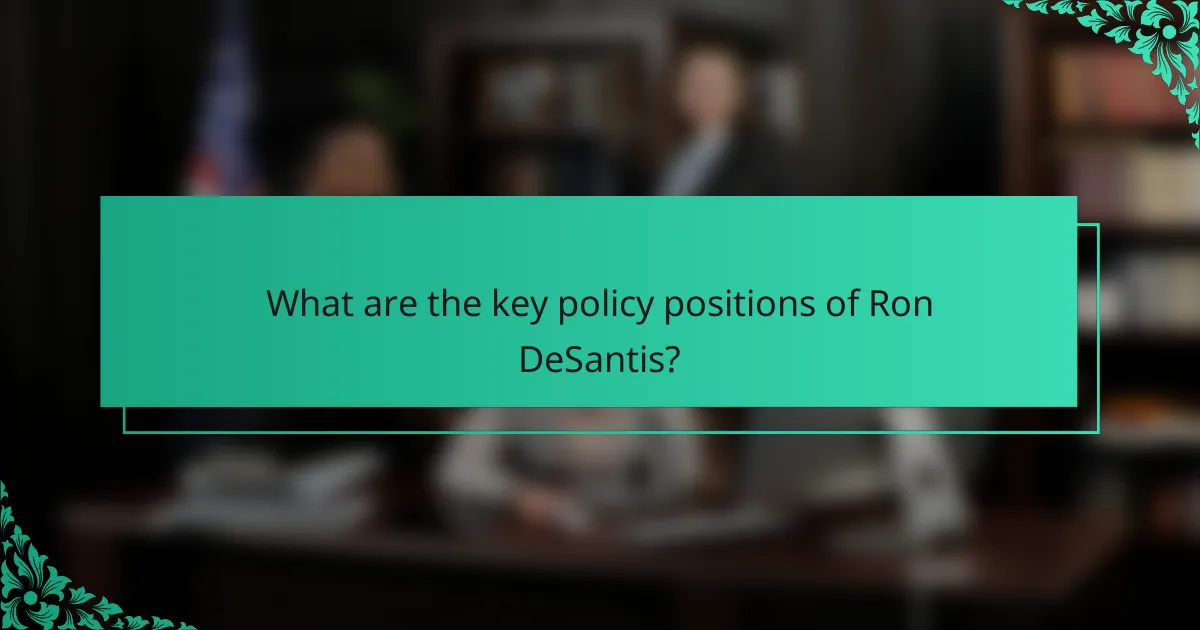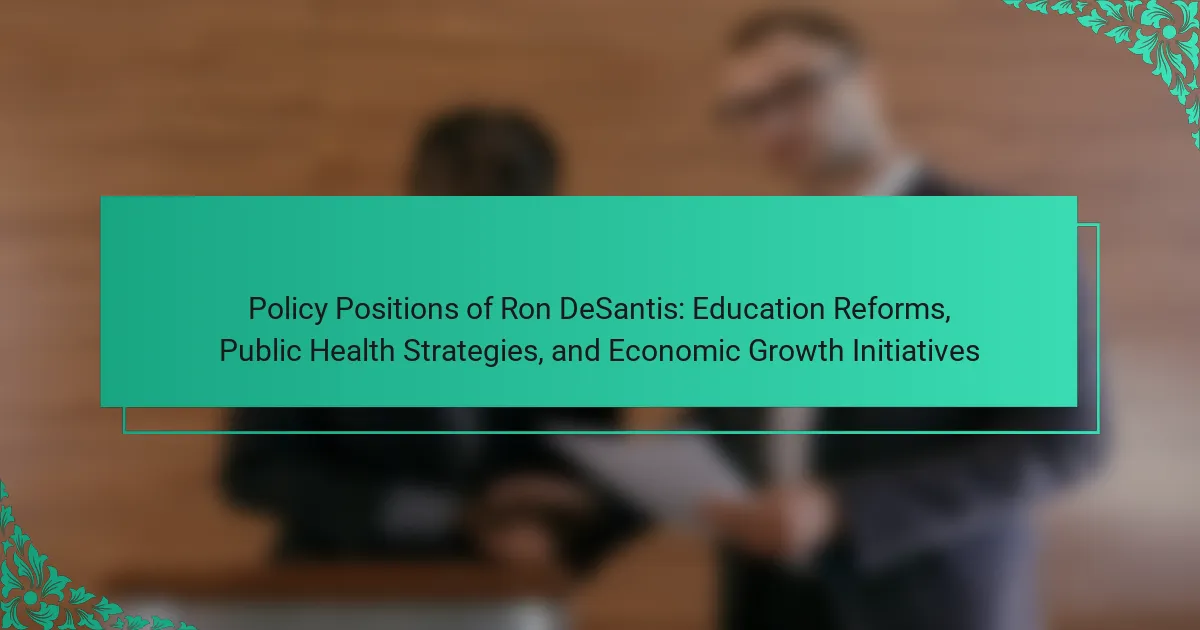Ron DeSantis is a prominent political figure known for his policy positions on education reform, public health strategies, and economic growth initiatives. His education policies include advocating for school choice, expanding charter schools, and banning critical race theory in schools. In public health, DeSantis emphasizes personal freedoms, opposes vaccine mandates, and supports vaccine choice. Economically, he focuses on tax cuts, reducing regulations, and creating a favorable business climate to attract businesses to Florida. These policies aim to enhance individual liberties and stimulate economic growth within the state.

What are the key policy positions of Ron DeSantis?
Ron DeSantis’s key policy positions include education reform, public health strategies, and economic growth initiatives. He advocates for school choice and expanding charter schools. DeSantis supports banning critical race theory in schools. His public health strategy emphasizes personal freedoms and limited government intervention. He opposes vaccine mandates and promotes vaccine choice. Economically, DeSantis focuses on tax cuts and reducing regulations. He aims to attract businesses to Florida through a favorable business climate. His policies are designed to enhance individual liberties and stimulate economic growth in the state.
How do education reforms shape Ron DeSantis’s policy agenda?
Education reforms significantly influence Ron DeSantis’s policy agenda. His administration prioritizes school choice and parental control in education. DeSantis advocates for expanding charter schools and voucher programs. These initiatives aim to increase competition among schools. They also seek to provide families with more educational options. Furthermore, DeSantis emphasizes curriculum transparency and limits on certain educational content. His policies reflect a broader conservative agenda focused on traditional values in education. The impact of these reforms aligns with his political base’s interests. This approach has garnered both support and criticism across various communities.
What specific education reforms has Ron DeSantis implemented?
Ron DeSantis has implemented several specific education reforms in Florida. He expanded school choice options through the Family Empowerment Scholarship program. This program provides vouchers for students to attend private schools. DeSantis also signed legislation to eliminate Common Core standards. He replaced them with new benchmarks known as the Florida B.E.S.T. Standards. Additionally, he increased funding for teacher salaries. His administration allocated $800 million to raise teacher pay in the 2022 budget. DeSantis also promoted civics education in schools. He mandated the inclusion of civics instruction in K-12 education. These reforms aim to enhance educational quality and accessibility in Florida.
How do these reforms impact student outcomes?
These reforms significantly improve student outcomes. They increase funding for public schools, which enhances resources and facilities. Research shows that increased funding correlates with higher student achievement. Additionally, reforms emphasize parental choice, allowing families to select schools that best meet their children’s needs. Studies indicate that school choice leads to better educational performance among students. Furthermore, the introduction of performance-based pay for teachers incentivizes high-quality teaching. This approach has been linked to improved student engagement and learning outcomes. Overall, these reforms contribute to more effective educational environments and better academic results for students.
What public health strategies are prioritized by Ron DeSantis?
Ron DeSantis prioritizes public health strategies that emphasize personal freedom and limited government intervention. He advocates for policies that minimize mandates related to vaccinations and masks. DeSantis promotes the use of treatments for COVID-19, such as monoclonal antibodies. He has focused on keeping schools and businesses open during health crises. His administration has also prioritized mental health initiatives. Additionally, DeSantis supports funding for public health infrastructure improvements. These strategies reflect his approach to balancing health measures with individual liberties.
How has Ron DeSantis approached public health during crises?
Ron DeSantis has approached public health during crises with a focus on minimizing restrictions. He prioritized keeping businesses and schools open during the COVID-19 pandemic. DeSantis emphasized personal freedom and individual choice regarding health measures. He opposed mask mandates and vaccine passports in Florida. His administration promoted early treatments and vaccination without imposing strict mandates. DeSantis also criticized federal guidelines that he deemed overly restrictive. This approach has garnered both support and criticism from various stakeholders. Overall, his public health strategy during crises has been characterized by a libertarian philosophy.
What are the implications of his public health policies on community health?
His public health policies significantly influence community health. These policies prioritize individual freedoms and limit government mandates. For example, the approach to COVID-19 emphasized personal choice over restrictions. This led to debates about vaccination rates and mask usage. Communities experienced varied health outcomes based on local adherence to these policies. Some areas reported lower vaccination rates, impacting herd immunity. Conversely, others maintained higher health compliance, reflecting diverse community responses. Overall, the implications are complex, with both positive and negative health outcomes observed across different regions.
How do economic growth initiatives reflect Ron DeSantis’s vision?
Economic growth initiatives reflect Ron DeSantis’s vision by prioritizing business-friendly policies and deregulation. DeSantis aims to attract investment and create jobs in Florida. His administration has implemented tax cuts to stimulate economic activity. These initiatives are designed to enhance Florida’s competitive edge. For example, the elimination of certain business taxes supports small businesses. Additionally, DeSantis promotes workforce development programs to meet industry needs. His focus on infrastructure improvements also facilitates economic growth. Overall, these strategies align with his goal of fostering a robust economy in Florida.
What specific initiatives has Ron DeSantis introduced to foster economic growth?
Ron DeSantis has introduced several initiatives to foster economic growth in Florida. These include tax cuts aimed at businesses and individuals. His administration implemented a reduction in the corporate income tax rate. This initiative encourages business investment and job creation. DeSantis also launched the “Florida Job Growth Grant Fund.” This fund provides financial assistance for infrastructure projects that support economic development. Additionally, he promoted workforce development programs to enhance skills training. These programs aim to meet the demands of Florida’s growing industries. DeSantis’s policies focus on reducing regulations to promote a business-friendly environment. Overall, these initiatives are designed to stimulate economic activity and attract new investments.
How do these initiatives affect Florida’s job market?
These initiatives positively impact Florida’s job market by promoting economic growth and workforce development. Education reforms enhance skill acquisition among graduates. This leads to a more competent workforce, meeting employer demands. Public health strategies improve community well-being, fostering a stable environment for businesses. Economic growth initiatives attract investments, creating new job opportunities. For instance, Florida’s unemployment rate dropped to 3.0% in 2023, reflecting a robust job market. Overall, these initiatives contribute to a dynamic and expanding employment landscape in Florida.
How do education reforms, public health strategies, and economic growth initiatives interconnect in Ron DeSantis’s policies?
Ron DeSantis’s policies interconnect education reforms, public health strategies, and economic growth initiatives through a focus on enhancing workforce development. Education reforms aim to improve the quality of education, which in turn prepares students for the workforce. Public health strategies, particularly during the COVID-19 pandemic, emphasize keeping schools open to ensure continuous learning. This approach supports economic growth by providing a stable environment for families and businesses.
Additionally, DeSantis advocates for school choice, which aims to increase competition among educational institutions. This competition can lead to better educational outcomes, ultimately contributing to a more skilled workforce. Economic growth initiatives often include investments in health infrastructure, ensuring that a healthy population can participate effectively in the economy.
Overall, these three areas are designed to work together to create a robust economy, with education serving as a foundation for public health and economic prosperity.
What challenges does Ron DeSantis face in implementing his policy positions?
Ron DeSantis faces significant challenges in implementing his policy positions. These challenges include political opposition from Democrats and some moderate Republicans. Legislative gridlock can hinder the passage of his proposed reforms. Public opinion on issues like education and public health varies widely among constituents. Legal challenges may arise against his policies, particularly in education. Budget constraints can limit funding for his initiatives. Additionally, the COVID-19 pandemic has complicated public health strategies. The need for bipartisan support is crucial for successful implementation.
What can citizens do to engage with Ron DeSantis’s policy initiatives effectively?
Citizens can engage with Ron DeSantis’s policy initiatives by actively participating in public forums and town hall meetings. These events allow citizens to voice their opinions and ask questions directly. Citizens can also follow DeSantis’s official social media channels for updates and announcements. Engaging in discussions on these platforms can amplify their concerns and suggestions. Additionally, citizens can contact their local representatives to express support or opposition to specific policies. This direct communication can influence legislative decisions. Joining local advocacy groups focused on education, public health, or economic growth can further enhance civic engagement. These groups often organize campaigns and provide resources for citizens to get involved. Lastly, voting in local and state elections is crucial. It ensures that elected officials align with the citizens’ views on DeSantis’s initiatives.
The main entity of the article is Ron DeSantis, the Governor of Florida, whose policy positions encompass education reforms, public health strategies, and economic growth initiatives. The article outlines DeSantis’s advocacy for school choice, banning critical race theory, and promoting personal freedoms in public health, including opposition to vaccine mandates. It details specific reforms such as the Family Empowerment Scholarship program and tax cuts aimed at stimulating economic activity. Additionally, the article discusses the interconnectedness of these policies and the challenges DeSantis faces in their implementation, as well as ways for citizens to engage with his initiatives.
